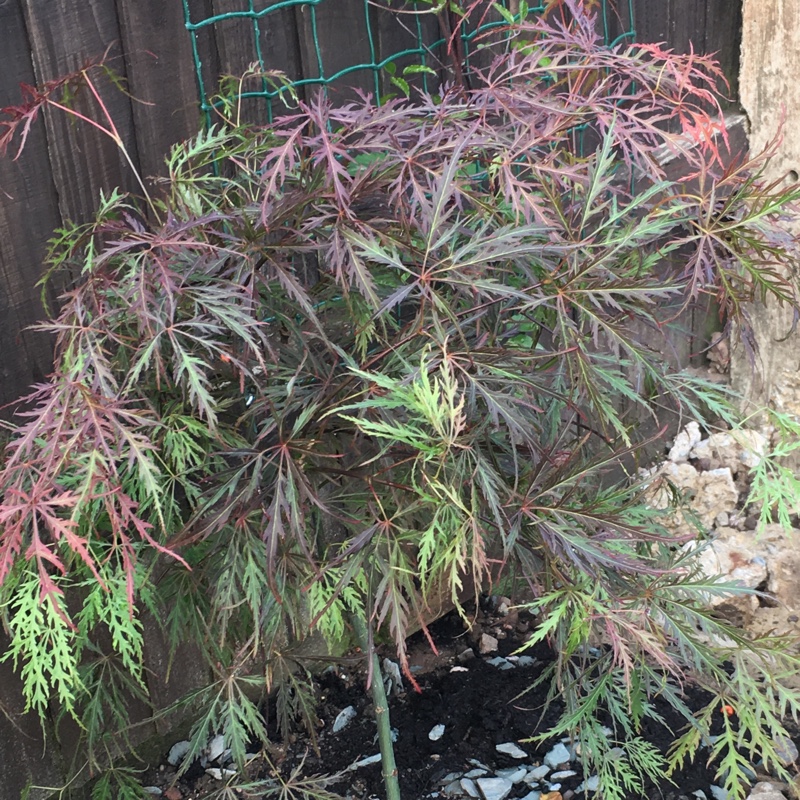
Acer palmatum 'Garnet' (Dissectum Group) syn. Acer palmatum var. dissectum 'Garnet'
Cut Leaf Japanese Maple 'Garnet'
Acers (or Maples as they are commonly known as) are trees and shrubs grown mainly for their colourful foliage. Many varieties are the trees and shrubs responsible for spectacular Autumn colours. There are many different types of Acer, from the smaller types, such as the very popular Acer palmatum (Japanese Maple) grown in many gardens, to the large maple trees that can grow up to 45 m in height. Most species have palmate leaves that are lobed (usually 3 - 9 lobes). The flowers, which are green, yellow, orange or red, in racemes, umbels or corymbs, appear in early Spring, and are followed by fruit, - samaras - or "helicopters", "whirlybirds" "maple keys" or "polynoses" due to the way they spin as they fall in Autumn. Acer palmatum (or the Japanese Maple) are a species of Acer which originate from parts of Japan and South Korea. They are smallish deciduous trees with deeply-lobed leaves which turn red, orange and yellow in autumn. The flowers are red in spring. They have a compact tidy habit that negates the need for heavy pruning. They reach maturity in 10 to 20 years. The Dissectum Group is a specific cultivar group within the species of Acer palmatum, which have finely cut leafs. They are often called the Cut Leaf Japanese Maple, Thread Leaf Japanese Maple or Lace Leaf Japanese Maple. 'Garnet' has feathery foliage the colour of garnet stones, and which turns scarlet in Autumn
Contributed by @twistedstar85
-
Full sun to partial shade
-
Occasional watering
-
Frost Hardy: 23F (-5°C)
-
Light and free draining
Common name
Cut Leaf Japanese Maple 'Garnet'
Latin name
Acer palmatum 'Garnet' (Dissectum Group) syn. Acer palmatum var. dissectum 'Garnet'
type
Trees or Shrubs
family
Sapindaceae
ph
4.5 - 6.5 Acid - Neutral
Plant & bloom calendar
-
Best time to plant
-
When the plant will bloom
full grown dimensions
 2.50 M
3.00 M
2.50 M
3.00 M
Acer palmatum 'Garnet' (Dissectum Group) syn. Acer palmatum var. dissectum 'Garnet'
Acers (or Maples as they are commonly known as) are trees and shrubs grown mainly for their colourful foliage. Many varieties are the trees and shrubs responsible for spectacular Autumn colours. There are many different types of Acer, from the smaller types, such as the very popular Acer palmatum (Japanese Maple) grown in many gardens, to the large maple trees that can grow up to 45 m in height. Most species have palmate leaves that are lobed (usually 3 - 9 lobes). The flowers, which are green, yellow, orange or red, in racemes, umbels or corymbs, appear in early Spring, and are followed by fruit, - samaras - or "helicopters", "whirlybirds" "maple keys" or "polynoses" due to the way they spin as they fall in Autumn. Acer palmatum (or the Japanese Maple) are a species of Acer which originate from parts of Japan and South Korea. They are smallish deciduous trees with deeply-lobed leaves which turn red, orange and yellow in autumn. The flowers are red in spring. They have a compact tidy habit that negates the need for heavy pruning. They reach maturity in 10 to 20 years. The Dissectum Group is a specific cultivar group within the species of Acer palmatum, which have finely cut leafs. They are often called the Cut Leaf Japanese Maple, Thread Leaf Japanese Maple or Lace Leaf Japanese Maple. 'Garnet' has feathery foliage the colour of garnet stones, and which turns scarlet in Autumn
Flowering
From Early Spring TO Early Spring
Most acers and maples have somewhat insignificant flowers. The flowers can be green, yellow, orange or red, and usually appear in early Spring, and are an early source of nectar and pollen for bees.
Planting
From Late Winter TO Early Spring
Smaller varieties can be grown in pots and containers. The best time for planting is late Winter / early Spring, before the leaves appear
Propagating by grafting
From Early Summer TO Mid Summer
Some acers or maples are best propagated by grafting. This certainly applies to 'Shirasawanum' varieties.
Propagating by cuttings
From Late Spring TO Mid Summer
Propagation methods vary according to the variety. Most varieties are propagated by means of softwood cuttings.



























